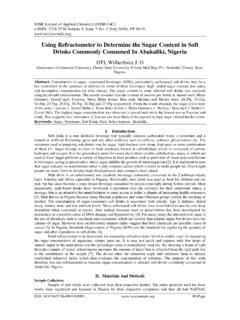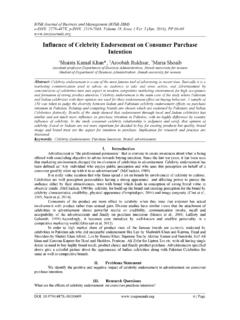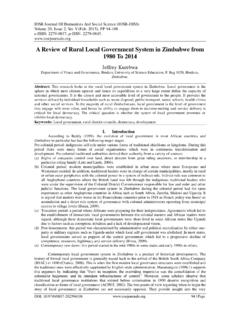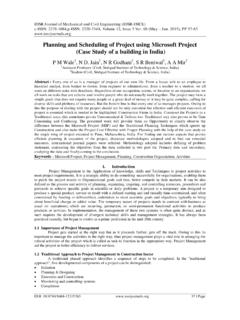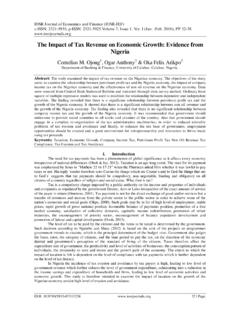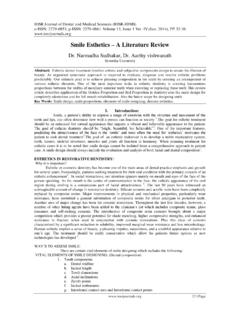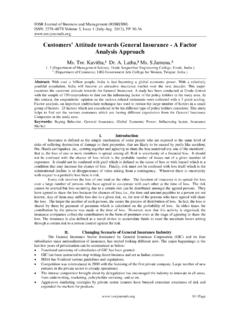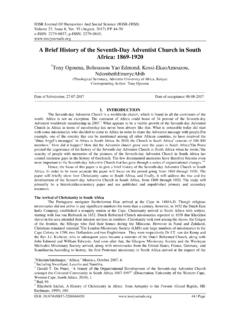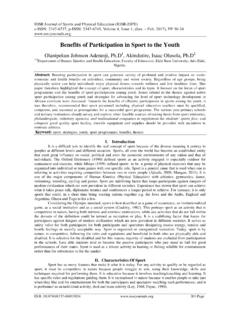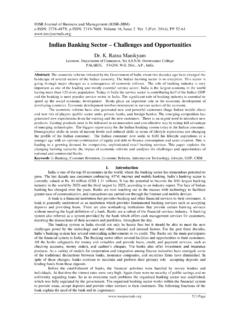Transcription of Evaluation of Training and Development: An Analysis of ...
1 IOSR Journal of Business and Management (IOSR-JBM) ISSN: 2278-487X. Volume 5, Issue 2 (Sep-Oct. 2012), PP 16-22 16 | Page Evaluation of Training and Development: An Analysis of Various Models Harshit Topno Abstract: Training and development enhances efficiency and develops a systematic way of performing duties and assigned tasks. Moreover it bridges the gap between job requirement and employees present specification. Training like any other organizational activity requires time, energy and money. It s an investment in employees productivity and retention by providing for career progression and employees job satisfaction over the long time.
2 Therefore the organisation needs to know whether their investment is being spent effectively or not. For this continuous Evaluation of Training and development is necessary. Evaluation of Training and development means assessment of the impact of Training on trainee s performance and behaviour. The present paper is descriptive in nature falls under the category of general review for understanding the conceptual framework of Evaluation , its needs and purpose and the various models adopted by organisation for Evaluation purpose. Finally in conclusive remark paper suggests the most widely used model and what are the issues which lead to ignorance of Evaluation as well as in the course of Evaluation .
3 Keywords: Evaluation , Expenditure, Models, Organisation, Training and Development I. Introduction Training like any other organizational activity requires time, energy and money. It s a critical investment in a strategy that leads to internal promotion, succession planning and employees development. It s an investment in employees productivity and retention by providing for career progression and employees job satisfaction over the long time (Bowes, 2008). Therefore the organisation needs to know whether their investment is being spent effectively or not. For this continuous Evaluation of Training and development is necessary.
4 Evaluation of Training and development means assessment of the impact of Training on trainee s performance and behaviour. Due to increasing expenditure of Training and development, number of organisations is raising questions concerning the return on these investments. There is a decreasing willingness to spend money on faith and an increasing pressure to justify Training and development costs. Baldwin and Ford have estimated that not more than 10 percent of Training and development expenditure actually results in transfer to the job. In this context, it is imperative for those in the field to focus on Evaluation of Training and development and properly demonstrate and communicate to management that Training efforts are making worthwhile contribution.
5 II. Evaluation : A Comprehensive Approach Evaluation of Training and development is the most essential aspect of Training programme. Generally all good Training and development programmes start with identification of Training and development needs and ends with Evaluation of Training (Gopal, 2009). Training Evaluation ensures that whether candidates are able to implement their learning in their respective work place or to the regular routines (Nagar, 2009). Phillips (1991) defined Evaluation as a systematic process to determine the worth, value or meaning of something. Holli and Colabrese (1998) defined Evaluation as comparisons of an observed value or quality to a standard or criteria of comparison.
6 It is the process of forming value judgements about the quality of programmes, products and goals. Boulmetis and Dutwin (2000) defined Evaluation as the systematic process of collecting and analyzing data in order to determine whether and to what degree objectives were or are being achieved. Schalok (2001) defined effectiveness Evaluation as the determination of the extent to which a programme has met its stated performance goals and objectives. Evaluation , in its crudest form, is the comparison of objectives with effects answer the question of how far Training has achieved its objectives.
7 Evaluation can be difficult because it is often hard to set measurable objectives and even harder to collect the information on the results or to decide on the level at which the Evaluation should be made. The process of evaluating Training and development has been defined by Hamblin (1974) as, any attempt to obtain information (feedback) on the effects of Training programme and to assess the value of the Training in the light of that information. In other words Evaluation may be defined as the systematic collection and assessment of information for deciding how best to utilise available Training resources in order to achieve organisational goals.
8 In other words Training Evaluation refers to process of collecting and measuring the outcomes needed to determine whether Training is effective. The Evaluation design refers to the collection of Evaluation Of Training And Development: An Analysis Of Various Models 17 | Page information including what, when, how and from whom that will be used to determine the effectiveness of the Training programme (Noe, 2008). Evaluation of Training and development involves assessing whether it is achieving its objectives, it is effective or not. Training effectiveness refers to the benefits that the company and the trainees receive from Training .
9 Benefits for trainees may include learning new skills or behaviour. Benefits for the company may include increased sales and more satisfied customers. However, it is very difficult to measure the effectiveness of Training and development because of its abstract nature and long term impact on the trainees and the organisation (Prasad, 2005). III. Literature Review Ramachandran (2010) has made an analytical study on effectiveness of Training programme of different cadre of employees working in a public sector organization. The result reveals that employees differed in effectiveness of Training programme on the basis of demographic characters.
10 It is also inferred that experience and education of the employees of the organization is predominating and determining factor in Training programme. Nagar (2009) has viewed that Training budgets are growing at a phenomenal pace as organization use Training to build required skills, indoctrinate new employees, transform banking culture, merge new acquisitions into the organization and build multiple skills for radically changing jobs. Scholar has made an attempt to study the effectiveness of Training programmes being conducted by the commercial banks in public as well as in the private sector based on the responses of their clerical level staff.
